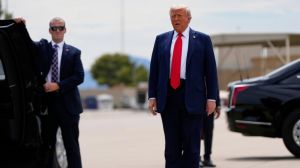Ritu Sarin is Executive Editor (News and Investigations) at The Indian Express group. Her areas of specialisation include internal security, money laundering and corruption. Sarin is one of India’s most renowned reporters and has a career in journalism of over four decades. She is a member of the International Consortium of Investigative Journalists (ICIJ) since 1999 and since early 2023, a member of its Board of Directors. She has also been a founder member of the ICIJ Network Committee (INC). She has, to begin with, alone, and later led teams which have worked on ICIJ’s Offshore Leaks, Swiss Leaks, the Pulitzer Prize winning Panama Papers, Paradise Papers, Implant Files, Fincen Files, Pandora Papers, the Uber Files and Deforestation Inc. She has conducted investigative journalism workshops and addressed investigative journalism conferences with a specialisation on collaborative journalism in several countries. ... Read More
"Discussions on removing in-built commissions from defence deals are on"
One of the reasons, George Fernandes says, he was so reluctant to take over the defence portfolio, was because he did not possess a suita...

One of the reasons, George Fernandes says, he was so reluctant to take over the defence portfolio, was because he did not possess a suitable wardrobe for ceremonial functions. Five months into the job, everyone is used to seeing Fernandes, 68, in his trademark-crumpled kurtas and chappals during formal meetings and ceremonies. But what may have come as a pleasant surprise to the quintessential opposition leader is that, suddenly, his views on every possible subject have become relevant. He has been holding forth on his pet obsession, China, the emerging security scenario and his trouble-shooting trips to Chennai. In an interview with Ritu Sarin, he discusses the post-Bofors environment in the Defence Ministry and how he is scouring the corridors of power for scandals. Excerpts:How do you find the environment in the Ministry of Defence?
The MoD works on a fixed, allocated budget and the allocations are fairly tightly controlled. However, large defence purchases are made and experience has shown that there is a lot of room for corruption. Bofors is a classic example — it is still haunting the country and there is an ongoing, continuous effort for covering the truth.
What I have observed in the MOD is that there are outside lobbies, maybe comprising arms-dealers or high-profile operators — who could be in Parliament or simply be people who have interests in these defence deals. All the important dealers have stationed their agents here and there is a tendency among the arms merchants to see if they get the better of their rivals. This is where there is scope for corruption.
How do these lobbyists function? How has their stranglehold on the system continued after scams like the Bofors and HDW?
People say a lot of money has passed hands in major transactions but nobody has, yet, given me proof. In one case, a person, whose credentials are above board, gave a written statement about money being paid for a major deal. But he is yet to provide me with concrete evidence.
Also, in these five months, I have still not had a case where the lobbyists have had access to the Defence Minister’s office. I have not directly come face-to-face with any instance of corruption or influence-peddling. There have only been some faint attempts on the part of a few people to see if they can have access to me.
Recently, I hit upon an idea of putting up a dozen complaint boxes in the MOD. Many complaints have come and where we have seen prima facie room for further investigation, action has been set into motion. A majority of these are allegations about one particular agency or the other trying to influence decision-making, again, on arms-purchases.
Are you convinced that kickbacks in defence deals have stopped after the Bofors scam?
In the Defence industry, lobbyists are a universal phenomenon and the arms merchants are part of very, very powerful lobbies. To use Mrs Indira Gandhi’s one-liner, corruption is a global phenomenon. There are a lot of published, well-researched writings on this. But these financial transactions do not take place within their country of operations — they invariably take place in tax havens or in secret Swiss bank accounts. Look at the time it has taken us to get to the root of the Bofors bribes. Even today see how the money is shifting from country to country.
Has India, like several other countries, like the UK, accepted the principal of in-built commissions in defence deals? Is it just that kickbacks have become a bad word and the commissions are continuing?
Home Minister L.K. Advani and I shared thoughts on this subject recently. We discussed how one way of dealing with this problem was to see if we could impress upon the establishments from whom we make our arms purchases that the built-in commissions (depending on the class of the product) taken by the arms manufacturers should be done away with. The problem is: even if you do not accept it, even then there are arms manufacturers who will say this is the price.
Are the in-built commissions continuing in India?
The bulk of our arms purchases are from Russia. Talks, since I have been here, have been directly between the customer (us) and the seller (the Russian establishment). In this buyer-seller deal that we have been having, so far there has been no cushion that had to be shared or ferreted away. But as I was saying, the Home Minister and I were discussing the issue and we felt that we should tell all those from whom we are going to buy our weapons, that the prices should not be padded with commission or bribery and that if they are padded we should be given that item by deducting that quantum of money.
So, is a new arms-purchase policy on the anvil?
That is what we have discussed. But we are yet to take a formal decision. What this means is that there will be no kickbacks and wherever there is a cushion, it must be identified and we should be told that this is the extent to which your price will be reduced.
The only problem here is that prices of defence items are also subject to negotiations. These days the weapons bazaar has somewhat changed its profile. There are essentially three major arms manufacturers USA, Russia and France. The competition has become so sharp that it is no longer a sellers market. It is also a buyers market. If an item is available for $ 1 million, you can bargain and bring it down to $700,000. And in India, the negotiations between MoD officials and the manufacturers are held in a very professional, transparent manner.
What about internal transparency? How much accountability is there in the MoD for internal functioning and purchases?
In the MoD, out of the budget of Rs 42,000 crore, an overwhelming sum will go in payment of salaries. Then, there are ordinance purchases which are purely book transfers. I am still in the process of trying to find out where the various leaks can take place. For instance, see how defence money gets squandered: political parties, Ministries and State governments together owe the MoD about Rs 200 crore for the hiring of IAF aircraft. This money is coming out of the MoD’s budget and all this is money meant for defending the country. But people use aircraft for all sorts of unofficial work and this is just one example I am giving you on how our money is being squandered.
Photos





- 01
- 02
- 03
- 04
- 05



























